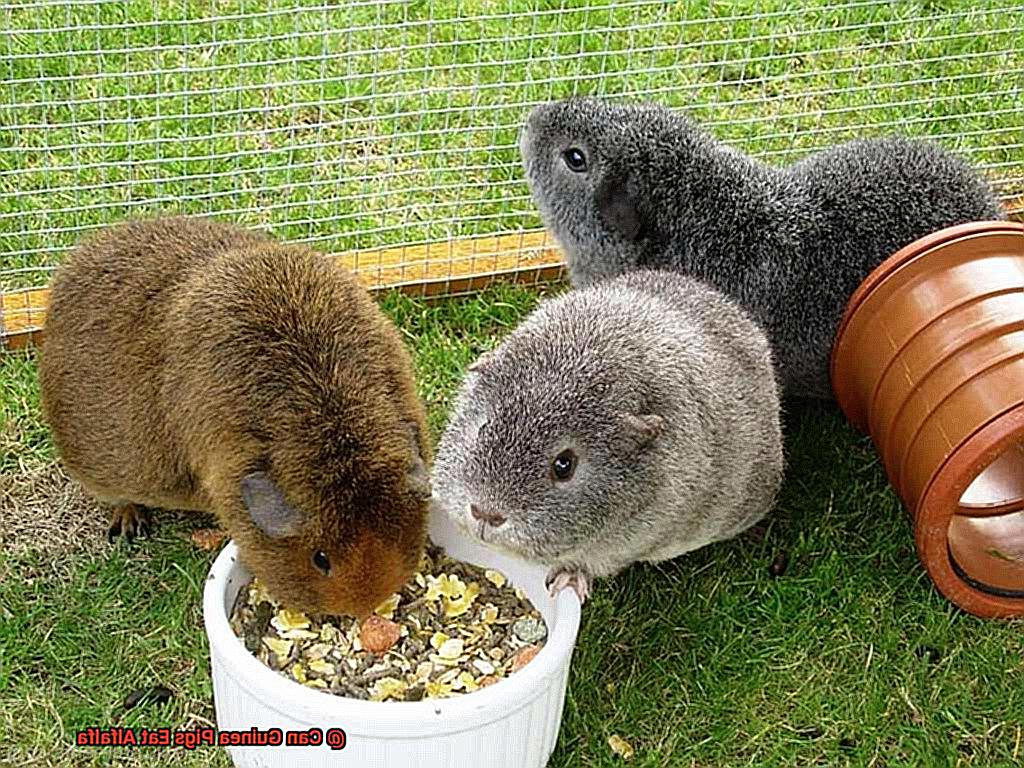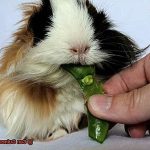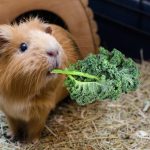Do you love your cuddly little guinea pig and want to make sure they stay healthy and happy?
Then it’s important to give them the right kind of food. As a responsible owner, you might wonder if alfalfa is a safe and nutritious option for your furry friend.
Alfalfa is a type of legume that’s packed with vitamins, minerals, and fiber. It’s often used as animal feed because of its nutrient-rich properties.
But can guinea pigs eat alfalfa without any negative effects? The answer is yes, but there are some things you need to keep in mind.
Alfalfa contains protein and calcium, which can cause bladder stones if consumed in excess. Not all guinea pigs react the same way to alfalfa either, so it’s important to watch for any adverse reactions.
Whether you’re a new owner or just curious about these adorable animals’ nutritional needs, keep reading to learn more.
Benefits of Alfalfa Hay for Young and Pregnant Guinea Pigs
Contents
One important aspect of their diet is hay, and alfalfa hay is a popular choice for young and pregnant guinea pigs.
But what makes it so special? Alfalfa hay is a nutritional powerhouse.
It’s packed with protein, calcium, and essential vitamins and minerals that are crucial for the healthy growth and development of young guinea pigs. This makes it the go-to food for pregnant guinea pigs, who need extra nutrients to support their growing offspring.
But alfalfa hay isn’t just about nutrition. Its high fiber content is also great for digestion, especially for young guinea pigs who are still developing their digestive system.
This can help prevent constipation and other digestive issues that are common in these furry little creatures. And let’s not forget about the energy boost that alfalfa hay provides.

With its high carbohydrate content, it can give young and pregnant guinea pigs the energy they need to stay active and playful. This is important for their overall health and happiness.
In addition to all these benefits, alfalfa hay also has anti-inflammatory properties. This can be particularly helpful for pregnant guinea pigs, as it can reduce inflammation during pregnancy.
And for young guinea pigs who may be more susceptible to illnesses or infections, alfalfa hay’s anti-inflammatory properties can provide an added layer of protection. However, it’s important to note that although alfalfa hay can be beneficial for young and pregnant guinea pigs, adult guinea pigs should only consume it occasionally due to its high calcium content.
Timothy hay is a healthier alternative for their daily diet because it contains the necessary fiber without causing health issues such as bladder stones.
So, alfalfa hay is an excellent choice for young and pregnant guinea pigs due to its numerous health benefits like improved digestion, increased energy levels, essential nutrients for growth and development, and reduced inflammation.
To ensure your furry friend has a happy and healthy life, make sure their diet consists of a balanced mix of hay, fresh vegetables, and pellets.
Why Timothy Hay is Better for Adult Guinea Pigs
And when it comes to hay, Timothy hay is the ideal choice for adult guinea pigs.
So, what makes Timothy hay so great? For starters, it has a low calcium content which is crucial in preventing bladder stones, a common issue for guinea pigs.
Additionally, Timothy hay has high fiber content which promotes healthy digestion and helps prevent gastrointestinal issues such as bloating and gas. But that’s not all.
Timothy hay is also low in protein compared to other types of hay like alfalfa. While protein is crucial for the growth of young and developing guinea pigs, adult guinea pigs require less protein in their diet.
Excessive protein intake can lead to weight gain and other health issues in adult guinea pigs. The coarse texture of Timothy hay is another advantage.
Guinea pigs’ teeth continue to grow throughout their lives, and chewing on hard and fibrous material is necessary to keep them healthy. Timothy hay provides this necessary toughness while still promoting good dental hygiene.
If you want to offer your furry friend a variety of hays, oat hay and botanical hay are excellent alternatives that provide additional nutrients and flavors while being safe for adult guinea pigs.
Other Types of Hays for Variety
And when it comes to hay, there are so many options beyond the standard alfalfa hay.
To give your guinea pig some variety in their diet, try offering oat hay. This sweet-tasting hay is lower in calcium than alfalfa hay, making it a great option for adult guinea pigs who need less calcium in their diet.
Plus, oat hay provides fiber and protein for overall health, making it a delicious dessert for your little friend. Another great option is botanical hay, which is made from a blend of different grasses, herbs, and flowers.
This type of hay provides a diverse range of nutrients and textures for guinea pigs to enjoy. Think of it as a trip to the local botanical garden for your furry friend.
Some common ingredients found in botanical hay include chamomile, dandelion, and marigold. When it comes to the most commonly recommended type of hay for adult guinea pigs, Timothy hay takes the cake.
This hay has a lower calcium content than alfalfa hay and is high in fiber, which helps promote healthy digestion. It should make up the majority of your guinea pig’s hay intake.
While alfalfa hay can be offered as a treat or supplement to adult guinea pigs, it should not be the main source of hay in their diet. Too much calcium can lead to health problems such as bladder stones if consumed in excess.
By offering a variety of hays to your guinea pig, you can provide them with a balanced and nutritious diet. Rotating between oat hay, botanical hay, timothy hay, and even alfalfa hay can give your furry friend different textures and nutrients to keep them happy and healthy.
Fresh Vegetables for a Balanced Diet
Just like humans, guinea pigs require a balanced diet to maintain good health and prevent illnesses.
Fresh vegetables provide a variety of essential vitamins and minerals that are necessary for their overall well-being. Think of hay as the foundation of a guinea pig’s diet, and fresh vegetables as the cherry on top.
They provide taste, texture, and most importantly, nutrients. Vegetables such as bell peppers, cucumbers, tomatoes, and leafy greens are all excellent choices for your furry friend.
Leafy greens, in particular, are a great source of vitamin C, which is essential for your guinea pig’s immune system. Guinea pigs cannot produce vitamin C on their own and must obtain it through their diet, just like humans.
Therefore, make sure to include kale, spinach, or romaine lettuce in your furry friend’s dishes. If you’re introducing new vegetables to your guinea pig’s diet, it’s important to do so gradually.
This will prevent any digestive issues and allow your guinea pig’s system to adjust accordingly. Start with small portions of one vegetable at a time and gradually increase the variety and quantity over time.
Before feeding your guinea pig, it’s crucial to wash all vegetables thoroughly. This will destroy any pesticides or harmful bacteria that may be present.
So how much food should you feed your furry friend? The recommended quantity is about one cup of fresh vegetables per day for every two guinea pigs.
However, it’s important not to overfeed vegetables because doing so can lead to digestive problems such as diarrhea. In conclusion, fresh vegetables are a vital component of a balanced diet for guinea pigs.
They contain the essential vitamins and minerals that are necessary for their health and well-being.
Introducing New Vegetables Gradually
When it comes to caring for your beloved guinea pig, ensuring a healthy and balanced diet is of utmost importance.
One critical aspect is introducing new vegetables gradually to avoid digestive issues such as bloating and diarrhea.
Picture your guinea pig’s digestive system as a garden – you wouldn’t want to introduce a bunch of new flowers all at once, and the same goes for vegetables.
Start small and observe any changes in your guinea pig’s behavior or health.
As herbivores, guinea pigs require a diet that is high in fiber and vitamin C. To avoid any sudden changes, gradually introduce small amounts of one vegetable at a time, waiting a few days before offering another.
This way, you can monitor their response to the new food and ensure that they are not experiencing any adverse effects. Incorporating a variety of vegetables into their diet is crucial to provide all the necessary nutrients.
Bell peppers, lettuce, spinach, cucumbers are all great options, but it’s essential to avoid those high in calcium or oxalic acid such as kale, parsley, and spinach. These should only be given in moderation.
Hay is also an essential component of your guinea pig’s diet. Timothy hay is an excellent choice as it is low in calcium and high in fiber.
MBM5ZbIVLb4″ >
Health Issues from High Calcium Intake in Alfalfa Hay
Adult guinea pigs are at risk of high calcium intake from alfalfa hay, which can lead to bladder and kidney problems.
Bladder stone formation is a potential health issue caused by excessive calcium intake that can cause pain, blood in the urine, and difficulty urinating. This condition requires veterinary attention and may require surgical intervention to remove the stones.
Kidney problems like kidney stones can also arise from high calcium intake, leading to discomfort and difficulty urinating. To keep your adult guinea pig healthy and free of these health issues, it’s essential to monitor their diet and provide them with a varied diet of hay, fresh vegetables, and fruits.
Timothy hay is an excellent alternative to alfalfa hay for adult guinea pigs because it has lower calcium levels and provides the necessary fiber for healthy digestive health. Think of your guinea pig’s digestive system as a garden that requires care and attention.
Just as you wouldn’t want to overwhelm a garden with too many new flowers at once, try adding new foods to your guinea pig’s diet gradually. By providing a balanced diet and monitoring their calcium intake, you can help prevent health problems and keep your furry friend healthy and happy.
Also Read: Can Guinea Pigs Eat Clover? – Rock Your Pets
Conclusion
In conclusion, taking care of your guinea pig’s diet is crucial for their overall health and happiness.
While alfalfa hay may be a tasty treat for young and pregnant guinea pigs due to its high calcium content, it should only be given occasionally to adult guinea pigs. Overconsumption of calcium can lead to bladder stones, which can cause discomfort and even require surgery.
Timothy hay is the go-to option for adult guinea pigs as it contains the necessary fiber for digestive health and has a lower calcium content. However, mixing things up with different types of hay like oat or botanical hay will keep your furry friend’s taste buds happy.
Fresh vegetables are also an essential part of a balanced diet for guinea pigs as they provide vital vitamins and minerals. But remember to introduce new veggies gradually to prevent any tummy troubles.
If you’re ever unsure about what’s best for your pet, consulting with a specialist is always recommended.






